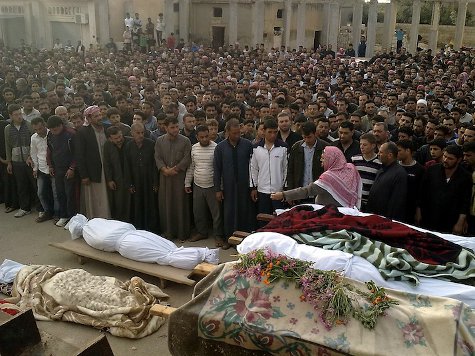
This morning’s key headlines from GenerationalDynamics.com.
- As Kofi Annan’s Syria peace plan collapses, Russia blames ‘external forces’
- Turkey says that we just have to wait and see what happens in Syria
- Ban Ki-moon asks the EU for airplanes and helicopters for observers
- Overseas aid is credited for falling child mortality rate
As Kofi Annan’s Syria peace plan collapses, Russia blames ‘external forces’
As it becomes increasingly clear that Syria’s president Bashar al-Assad agreed to go along with Kofi Annan’s “peace plan” simply to buy time to slaughter more innocent Arab citizens, al-Assad’s main backer, the Russians, are suffering another round of major humiliations, along with Kofi Annan himself. Russia has been al-Assad’s loyal backer, and has supplied huge amounts of weapons, while at the same time saying that Annan’s peace plan should end the violence. Since that obviously isn’t happening, Russia’s foreign minister Sergey Lavrov is blaming the “Friends of the Syrian people” group of Western and Arab nations, which he said was undermining UN peace efforts. (The “Friends of the Syria People” are 60 countries currently meeting in Paris to reinforce sanctions imposed on the Syrian regime.)
Apparently Lavrov believes that the U.S., Europe and Arab countries should just smile sweetly at al-Assad and say, “Oh you just go ahead and kill as many innocent Arabs as you want, as if they were cockroaches.” Here’s what Lavrov said:
There are countries, there are external forces, that are … encouraging the Syrian opposition not to cooperate with the government in providing for a ceasefire and the subsequent establishment of dialogue.
So, the Syria crisis still has a way to go before it unravels. Reuters
Turkey says that we just have to wait and see what happens in Syria
In the end, it’s going to be Turkey that decides what happens in Syria. If Turkey wants to take some action, then the West and the Arab League will go along with it, while Russia fumes. And as I wrote last week, Even without the United Nations Security Council, Turkey believes that it has the necessary legal backing to take military action on Syrian soil, thanks to the “Adana Agreement” signed with Syria in 1998.
Turkey’s Prime Minister Recep Tayyip Erdogan on Tuesday accused the Syrian regime of continuing to attack civilians, despite agreeing to Kofi Annan’s peace plan. He said:
Delaying [solutions to] the problem in Syria will only give the regime more time for new acts of brutality. The Syrian regime is using stalling tactics. Even though we have no hope for the cease-fire, we will wait, continue to closely follow the developments and bring Syria to the attention of the international community.
I’m interpreting his phrase “we will wait” to mean that Turkey will not intervene in Syria. Zaman (Istanbul)
Ban Ki-moon asks the EU for airplanes and helicopters for observers
The United Nations Security Council is expected to authorize a full mission of 250 observers to Syria on Wednesday. But U.N. Secretary-General Ban Ki-moon would like to send even more observers, and has asked European Union leaders to provide helicopters and airplanes for their mobility within Syria. Six observers have already arrived, and 25 more have already been authorized. The observers are facing the same Catch-22 that the original Arab League monitors did in January. The monitors are unarmed, and the U.N. is demanding that Syria guarantee their safety. But that means that the Syrian regime will have to control the movements of the monitors, which means it can make sure that any violence that occurs will be unseen by the monitors. The Arab League monitor effort is considered by many people to be a total fiasco. LA Times
Overseas aid is credited for falling child mortality rate
According to a report by Save the Children and the Overseas Development Institute, foreign aid is the biggest factor in reducing child mortality. Four million fewer children aged under five died in 2010 than in 1990. Over 50 million more children were enrolled in school in the last decade. 131 countries now have over 90 per cent immunization coverage for diphtheria, tetanus and major preventable childhood diseases such as measles, compared to just 63 in 1990. Foreign aid is responsible for these changes, according to the report. As usual, it falls to me as the gloomiest person in the world to point out that a reduction in child mortality means faster population growth, less food and other resources per capita, and more cannon fodder for the next war. Telegraph

COMMENTS
Please let us know if you're having issues with commenting.